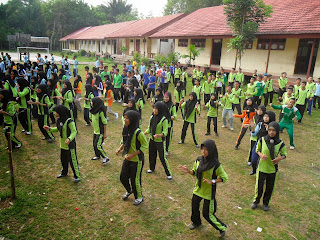Tuesday, October 22, 2013
Wednesday, July 13, 2011
PENELITIAN TINDAKAN KELAS (PTK)
A. Pendahuluan
Saat ini penelitian tindakan mulai mengalami sebuah perkembangan yang cukup signifikan. Penelitian ini dirasa sangat memberikan manfaat secara langsung sehingga banyak yang tertarik untuk melakukan jenis penelitian ini. Menurut pengertiannya penelitian tindakan adalah penelitian tentang hal-hal yang terjadi di masyarakat atau kelompok sasaran, dan hasilnya langsung dapat dikenakan pada masyarakat yang bersangkutan (Arikunto, 2006:90).
Tuesday, June 14, 2011
Factors in Effective Language Teaching Jack Richards
This posting examines four factors that can have a significant impact on the success of language teaching programs. Institutional factors include the school's organization culture and its approach to the maintenance of educational quality. Teacher factors include the skills and qualifications of teachers and the level of professional support provided. Teaching factors include the philosophy of teaching reflected in the program and how good teaching is supported and maintained. Learning factors include learners' views of the program as well as learning styles and motivations and how these are addressed within the program. Each of these
Relevansi Teori Psikologi Piaget, Vygotsky, dan Bruner dalam Pembelajaran Bahasa Inggris
Oleh: Sumardi, M.Hum*)
A. Pendahuluan
Manusia berkomunikasi dengan kuantitas yang tidak terhingga dalam kehidupannya sehari-hari. Segela aktivitas manusia tidak akan pernah terjadi tanpa adanya proses komunikasi, baik komunikasi verbal maupun non-verbal dalam rangka menyampaikan gagasan, pikiran, persaan dan pendapatnya. Sejak dimulai dari bangun tidur hingga tidur kembali di malam hari, bisa dibayangkan berapa kali seseorang mendengar dan
Monday, June 13, 2011
MULTIPLE-CHOICE TEST
1. The stimulus material to which the item refers will contain material which is relevant to the objectives of the test. Considering and responding to the material will be a worthwhile educational experience for the test-taker.
2. The stem and the keyed answer together will represent a meaningful and worthwhile response to a key or central issue in the stimulus material, not a merely peripheral one. Doing the item will not be a merely trivial experience for the test-taker1.
Saturday, June 4, 2011
A framework for task-based language teaching Nunan
Introduction and overview
In the first section of this chapter, I introduce a framework for task-based language teaching. The framework defines and exemplifies the key elements in the model that underlies this book including real-world/target tasks, pedagogical tasks and enabling skills. The next section outlines a procedure for creating an integrated syllabus around the concept of the pedagogic task. The section that follows is devoted to materials design considerations. It provides a procedure that can be used for planning lessons, materials and units of work. In the final section, the principles underlying the procedures described in the body of the chapter are laid out.
BEYOND TEST: ALTERNATIVES IN ASSESSMENT (BROWN: 2004)
In the public eye, tests have acquired an aura of infallibility in our culture of mass producing everything, including the education of school children. Everyone wants a test for everything, especially if the test is cheap, quickly administered, and scored instantaneously. But we saw in Chapter 4 that while the standardized test industry has become a powerful juggernaut of influence on decisions about people's lives, it also has come under severe criticism from the public (Kohn, 2000). A more balanced viewpoint is offered by Bailey (1998, p. 204): "One of the disturbing things about tests is the extent to which many people accept the results uncritically, while others believe that all testing is invidious. But tests are simply measurement tools: It is the use to which we put their results that can be appropriate or inappropriate."
Kathleen M. Bailey Autonomy and authority
The dynamic tension between language teachers’ professional autonomy and supervisors’ authority presents challenges for supervisors and teachers alike. This chapter considers autonomy and authority as the terms are used in supervision and language education. Specifically, we will explore the complex interaction between supervisors’ authority and teachers’ autonomy in making decisions and taking action. We will also examine the types of power at work in supervision, how and when teachers learn, and whether supervisors’ authority is genuine, delegated, or both. We begin with a case in which the supervisor must decide how much authority to exert and how much of a teacher’s autonomy to recognize and respect.





